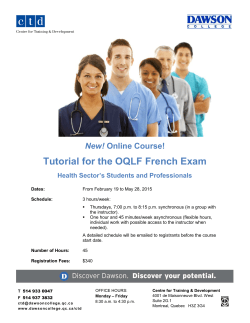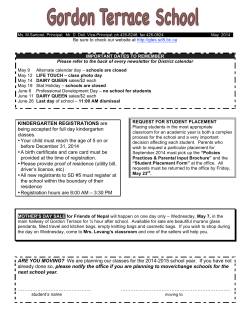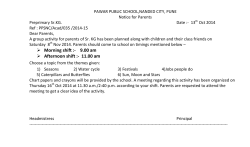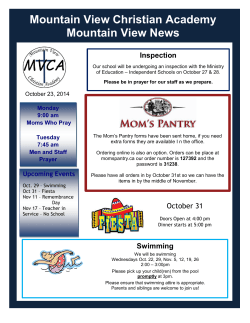
scand 341 - Department of Modern Languages and Cultural Studies
DEPARTMENT OF MODERN LANGUAGES AND CULTURAL STUDIES www.mlcs.ca 2014 SCAND 341 A1: Old Norse Mythology and Legends (Fall Term) Time: TR 11:00am-12:20pm Instructor: Dr Natalie Van Deusen Office: Arts 316-D Telephone: (no office phones) TA: Mansoureh Modarres Office: Arts 317-C Telephone: (no office phones) Place: V 103 E-mail: vandeuse@ualberta.ca Office Hours: TR 10:00am-11:00am or by appt. Fax: 780-492-9106 E-mail: modarres@ualberta.ca Office Hours: TBA or by appointment Fax: 780-492-9106 Course Website: eClass and https://sites.google.com/a/ualberta.ca/scand341/ Course Prerequisite: None Course-based Ethics Approval in place regarding all research projects that involve human testing, questionnaires, etc.? oYes þ No, not needed, no such projects involved Community Service Learning component o Required o Optional þ None Past or Representative Evaluative Course Material Available o Exam registry – Students’ Union http://www.su.ualberta.ca/services_and_businesses/services/infolink/exams o See explanations below þ Document distributed in class o Other (please specify) o NA Additional mandatory Instructional fees (approved by Board of Governors) ☐ Yes þ No Course Description and Objectives: This course provides an introduction to the religious beliefs, mythology, and legends of pre-Christian Scandinavia. It examines literature of the period from ca. 900-1250, which deals with these subjects. It also covers modern retellings of Old Norse myth and legend, specifically Neil Gaiman’s American Gods and J.R.R. Tolkien’s The Legend of Sigurd and Gudrún. 1 Texts:* E = Snorri Sturluson, The Prose Edda, trans. Jesse Byock. Penguin Classics (2005). P = The Poetic Edda, ed. and trans. Carolyne Larrington. Oxford University Press (2009). L = Lindow, John. Norse Mythology: A Guide to the Gods, Heroes, Rituals, and Beliefs. Oxford University Press (2001). A = Neil Gaiman, American Gods V = The Saga of the Volsungs, trans. Jesse L. Byock. Penguin Classics (2000). T = J.R.R. Tolkien, The Saga of Sigurd and Gudrún Articles and excerpts on eClass (indicated by *) *You may use electronic (Kindle, iBooks, etc.) versions of these books as long as the translations are the same. However, only printed materials will be allowed in open-book exams. Grade Distribution (see “Explanatory Notes”): Attendance Pop quizzes* Mid-term examination (October 30) Term paper** (due November 27) Final examination (December 10, 9:00a) 5% 10% 25% 30% 30% Date of Deferred Final Exam (if applicable): Tuesday, February 17, 2015 Explanatory notes on Assignments: * To ensure consistent student attendance, preparedness, and participation there will be six pop (i.e. unannounced) quizzes throughout the semester. The lowest quiz score will be dropped. ** The format of the term paper will be addressed during the second week of classes. Required Notes: “Policy about course outlines can be found in Section 23.4(2) of the University calendar.” Academic Integrity: “The University of Alberta is committed to the highest standards of academic integrity and honesty. Students are expected to be familiar with these standards regarding academic honesty and to uphold the policies of the University in this respect. Students are particularly urged to familiarize themselves with the provisions of the Code of Student Behaviour (online at http://www.governance.ualberta.ca/en/CodesofConductandResidenceCommunityStandards/Cod eofStudentBehaviour.aspx ) and avoid any behaviour which could potentially result in suspicions of cheating, plagiarism, misrepresentation of facts and/or participation in an offence. Academic dishonesty is a serious offence and can result in suspension or expulsion from the University.” Learning and Working Environment: The Faculty of Arts is committed to ensuring all students; faculty and staff are able to study and work in an environment safe and free of discrimination and harassment. It does not tolerate behaviour that undermines that environment. The Department urges anyone who feels this policy has been or is being violated to: • Discuss the matter with the person whose behaviour is causing concern; or 2 • If that discussion is unsatisfactory, or there is concern that directs discussion is inappropriate or threatening, discuss it with the Chair of the Department. For additional advice or assistance regarding this policy you may contact the student ombudservice (http://www.ombudservice.ualberta.ca/ ). Information about the University of Alberta Discrimination and Harassment Policy and Procedures is described in UAPPOL at https://policiesonline.ualberta.ca/PoliciesProcedures/Pages/DispPol.aspx?PID=110 Academic Honesty: All students should consult the information provided by the Office of Judicial Affairs (http://www.osja.ualberta.ca/Students.aspx ) and the Academic Integrity Undergraduate Handbook (http://www.osja.ualberta.ca/en/Students/UndergraduateHandbook.aspx ) regarding the definitions of plagiarism and its consequences when detected. If in doubt about what is permitted in this class, ask the instructor. Students involved in language courses and translation courses should be aware that on-line “translation engines” produce very dubious and unreliable “translations.” Students in languages courses should be aware that, while seeking the advice of native or expert speakers is often helpful, excessive editorial and creative help in assignments is considered a form of “cheating” that violates the code of student conduct with dire consequences. An instructor or coordinator who is convinced that a student has handed in work that he or she could not possibly reproduce without outside assistance is obliged, out of consideration of fairness to other students, to report the case to the Associate Dean of the Faculty. See the Academic Discipline Process (http://www.osja.ualberta.ca/TheDisciplineProcess.aspx ) Recording of Lectures: Audio or video recording of lectures, labs, seminars or any other teaching environment by students is allowed only with the prior written consent of the instructor or as a part of an approved accommodation plan. Recorded material is to be used solely for personal study, and is not to be used or distributed for any other purpose without prior written consent from the instructor. Attendance, Absences, and Missed Grade Components: Regular attendance is essential for optimal performance in any course. In cases of potentially excusable absences due to illness or domestic affliction, notify your instructor by e-mail within two days. Regarding absences that may be excusable and procedures for addressing course components missed as a result, consult sections 23.3(1) ) http://www.registrar.ualberta.ca/calendar/Regulations-and-Information/AcademicRegulation/23.3.html#23.3 ) and 23.5.6 (http://www.registrar.ualberta.ca/calendar/Regulationsand-Information/Academic-Regulation/23.5.html#23.5) of the University Calendar. Be aware that unexcused absences will result in partial or total loss of the grade for the “attendance and participation” component(s) of a course, as well as for any assignments that are not handed-in or completed as a result. In this course attendance is required in order for the student to get full benefit from the course, and counts for 5% of the final grade. Attendance will be monitored by a daily sign-up sheet. 3 Out of respect for the instructor and other students wanting to learn, texting and other cell phone use is not allowed in the classroom. Policy for Late Assignments: Students who consult in advance with an instructor regarding contingencies preventing the timely completion of an assignment may, at the discretion of the instructor, be granted an extension. Otherwise, assignments may be handed in with a 2%-per-class-day penalty assessed for each subsequent class-day of lateness. Specialized Support & Disability Services: If you have special needs that could affect your performance in this class, please inform your instructor during the first week of the term so that appropriate arrangements can be made. If you are not already registered with Specialized Support & Disability Services, contact their office immediately (2-800 SUB; email ssdsrec@ualberta.ca; phone 780-492-3381; WEB www.ssds.ualberta.ca). Grading: Marks for assignments, tests, and exams are given in percentages, to which letter grades are also assigned, according to the table below (“MLCS Undergraduate Grading Scale”). The percentage mark resulting from the entire term work and examination then produces the final letter grade for the course. “MLCS Undergraduate Grading Scale” Letter A+ A AB+ B BC+ C CD+ D F % Pts Descriptor 95-100% 4.0 Outstanding: Superior performance showing understanding and knowledge of the subject matter far exceeding expectations. 90-94% 4.0 Excellent: Superior performance showing comprehensive understanding of subject matter. 86-89% 3.7 Very good: Clearly above average performance with complete knowledge of subject matter. 82-85% 3.3 Very good 75-81% 3.0 Good: average performance with knowledge of subject matter generally complete. 70-74% 2.7 Good 66-69% 2.3 Satisfactory: Basic understanding of the subject matter 61-65% 2.0 Satisfactory 58-60% 1.7 Satisfactory 55-57% 1.3 Minimal Pass: Marginal performance; generally insufficient preparation for subsequent courses in the subject matter. 50-54% 1.0 Minimal Pass: Marginal performance; generally insufficient preparation for subsequent courses in the subject matter. 0-49% 0.0 Fail: Unsatisfactory performance or failure to meet course requirements. Note: Bursaries of $150.00 will be provided by the Norwegian service club Sons of NorwayTorskeklubben to students who have successfully completed a Scandinavian course (incl. SCAND 341) with a minimum grade of B-. 4 COURSE SCHEDULE Introduction Sept. 4: The Geography and Languages of Northern Europe (No reading assignment) Sept. 9: L, pp. 1-38 (Introduction) Sept. 11: *Tacitus, Germania; E, pp. 3-8 (Prologue) Creation and the Pantheon Sept. 16: P, pp. 3-13 (The Seeress’s Prophecy) E, pp. 9-53 (Gylfaginning, chs. 1-43) [L, pp. 317-318 (Völuspá)]1 Sept. 18: Odin Sept. 23: Sept. 25: P, 246-252 (The List of Rig) [L, pp. 260-261 (Rígsthula)] L, pp. 247-252 (Odin) P, pp. 14-38 (Sayings of the High One), 39-49 (Vafthrudnir’s Sayings), 50-60 (Grimnir’s Sayings) [L, pp. 150-151 (Grímnismál), 164-165 (Hávamál), 304-307 (Vafthrúdnismál) *Odin and Human Sacrifice, The Temple at Uppsala E, pp. 83-86 (Skaldskaparmal, ch. 2) [L, pp. 224-227 (Mead of Poetry)] Thor and Loki Sept. 30: L, pp. 287-291 (Thor) E, pp. 53-65 (Gylfaginning, ch. 44-48), 86-89 (Skaldskaparmal, ch. 3) P, pp. 78-83 (Hymir’s Poem), pp. 97-101 (Thrym’s Poem), 109-113 (All-Wise’s Sayings) [L, pp. 56-57 (Alvíssmál), 185-186 (Hrungnir), 189-191 (Hymir), 191-193 (Hymiskvida), pp. 293-296 (Thrymskvida), 302-304 (Útgarda-Loki)] Oct. 2: L, pp. 216-220 (Loki) P, pp. 84-96 (Loki’s Quarrel) E, pp. 90-94 (Skaldskaparmal, chs. 4-5) [L, pp. 214-216 (Lokasenna), 137-138 (Geirröd)] Gods of Fertility; the Enigmatic Gods; Gods of the Sea Oct. 7: L, pp. 121-126 (Frey), 126-128 (Freya) P, pp. 61-68 (Skirnir’s Journey) E, pp. 80-83 (Skaldskaparmal, ch. 1) [L, pp. 138-139 (Gerd), 198-199 (Idun)] 1 Square brackets ([ ]) indicate optional, but strongly recommended, reading. 5 Oct. 9: L, pp. 167-172 (Heimdall), 258-259 (Rán) E, pp. 108-118 (Poetic References) Baldr and Ragnarök Oct. 14: L, pp. 65-69 (Baldr), 254-258 (Ragnarök) P, pp. 3-13 (The Seeress’s Prophecy), 243-245 (Baldr’s Dreams) E, pp. 65-79 (Gylfaginning, chs. 49-55) [L, 70-71 (Baldrs draumar)] The Norse Gods in Modern Literature: American Gods Oct. 16: A, Part One; paper proposals due Oct. 21: A, Part Two Oct. 23: A, Parts Three and Four Review and Midterm Oct. 28: (No reading assignment. Please come prepared with questions for review) Oct. 30: Midterm exam Heroic Epic Nov. 4: P, pp. 114-141 (The Lays of Helgi) Nov. 6: V, pp. 33-55 Nov. 11: REMEMBRANCE DAY – NO CLASS Nov. 13: V, pp. 55-75 P, pp. 151-173 (Lay of Regin – Lay of Sigrdrifa) Nov. 18: V, pp. 75-93 P, pp. 174-194 (Fragment of a Poem about Sigurd – Brynhild’s Ride to Hell) Nov. 20: V, pp. 93-109 P, pp. 195-242 (The Death of the Niflungs – Lay of Hamdir) Heroic Epic in Modern Literature: J.R.R. Tolkien’s The Legend of Sigurd and Gudrún Nov. 25: T, Upphaf-IV Nov. 27: T, V-IX; papers due Conclusion and Review Dec. 2: (No reading assignment. Please come prepared with questions for review) FINAL EXAM: Wednesday, December 10, 9:00am 6
© Copyright 2025










